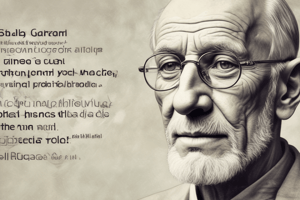Podcast
Questions and Answers
Who is credited with being one of the most influential psychologists of the 20th century?
Who is credited with being one of the most influential psychologists of the 20th century?
- Carl Rogers (correct)
- Sigmund Freud
- Albert Bandura
- B.F. Skinner
What is the process called when individuals strive to become the person they are capable of being?
What is the process called when individuals strive to become the person they are capable of being?
Self-actualisation
Rogers believed that people are inherently bad.
Rogers believed that people are inherently bad.
False (B)
Which of the following is NOT one of the primary principles necessary for person-centered therapy to work?
Which of the following is NOT one of the primary principles necessary for person-centered therapy to work?
What term describes the therapist's need to be completely honest with the client?
What term describes the therapist's need to be completely honest with the client?
What is the definition of unconditional positive regard?
What is the definition of unconditional positive regard?
What must a therapist do in order to bond with the client?
What must a therapist do in order to bond with the client?
Self-concept refers to the perceptions and beliefs an individual has about themselves, including their nature, unique qualities, and typical ______.
Self-concept refers to the perceptions and beliefs an individual has about themselves, including their nature, unique qualities, and typical ______.
What are the key factors that self-actualization depends on?
What are the key factors that self-actualization depends on?
Flashcards are hidden until you start studying
Study Notes
Carl Rogers
- Influential psychologist known for client-centered therapy, self-actualization, and theory of self.
- Advocated that humans are inherently good and capable of improvement.
- Emphasized self-actualization as a key process for fulfillment and happiness.
- Contrasts with earlier psychological theories that suggested behavior was determined by past experiences.
- Described healthy individuals as "fully-functioning," open to experiences, creative, and trusting their own judgment.
- The self-concept is formed through interactions with the environment and others.
Person-Centered Therapy
- Also known as client-centered therapy, emphasizes the client's active role in therapy.
- The therapist’s approach is nondirective and supportive, engaging with the client's topics of interest.
- Successful therapy requires three primary principles: genuineness, unconditional positive regard, and empathy.
- These principles are essential not only from therapists but also from significant people in a person's life for personal growth.
Primary Principles for Person-Centered Therapy
- Genuineness
- Unconditional positive regard
- Empathy
Genuineness
- Therapists must be authentic and honest with clients.
- Role modeling honesty fosters reciprocal honesty from the client.
Unconditional Positive Regard
- Involves accepting and supporting the client without conditions.
- Essential for self-worth and well-being; stronger self-worth leads to greater confidence and motivation.
- Childhood experiences with caregivers shape feelings of self-worth.
- Conditions on affection from parents can lead to feelings of unworthiness; unconditional love helps in restoring congruence.
Empathy
- Building a strong bond with the client requires the therapist to empathize deeply.
- The client drives the therapy process while the therapist acts as a supportive guide.
Key Factors for Self-Actualization
- Influenced by how others treat them.
- Self-perception and view of oneself.
- Skills in managing negative conflicts effectively.
Self-Concept
- Refers to an individual’s perceptions and beliefs about their nature and behavior.
- An organized representation of thoughts and values regarding oneself.
Studying That Suits You
Use AI to generate personalized quizzes and flashcards to suit your learning preferences.




